Did I love Zootopia? Yes I did. If you’re asking me if I agree with the consensus opinion that Zootopia presents an astonishingly astute commentary on bigotry, xenophobia and police profiling then my answer would have to be yes. Do I think this commentary ever slips into overbearing pontificating which interferes with the movie’s ability to entertain audiences of all ages? Absolutely not. Is any movie featuring animals running around in tiny clothing inherently appealing? Of course, but Zootopia elevates the game for any future talking animals movies.
Still, omg, so cute…
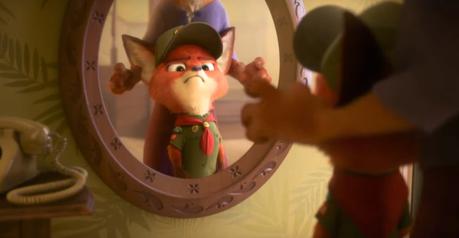
His eyes look like little buttons!
If you’ve already seen Zootopia, then you know the “answer my own question” device I used in the intro is from the movie. It’s how wily conman Nick Fox (Jason Bateman) coaches optimistic young cop Judy Hopps (Ginnifer Goodwin) to present herself at a press conference after they’ve cracked a big missing persons case together. She needs to handle herself more like a politician, he says. Never directly answer a question presented to you by a reporter. Instead, re-phrase it into the question you actually want to answer.
We laugh because it’s true. That is how politicians prefer to present themselves (although lately they just descend into unintelligible yelling). We also laugh because by that point Nick and Judy have become a truly endearing buddy duo, he the slick-talking cynic and her the Type A overachiever who naively believes in the slogan “anyone can be anything” displayed throughout the city of Zootopia. However, this is the calm before the storm. This is when Zootopia takes a surprisingly serious turn.
But let’s not get ahead of ourselves.
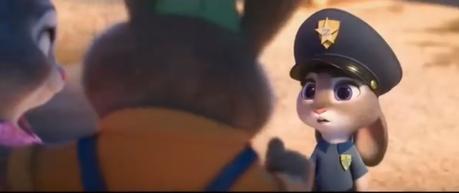
Judy as a young girl, undaunted by those who would dissuade her from her dreams
We first meet Judy Hopps, a rabbit from a family of carrot farmers, as a precocious little kid in a school play, re-enacting how the predators and prey of this fictional universe of anthropomorphic animals evolved beyond their natural instincts and now live in peaceful harmony. At the end, the kids shed their costume as predator/prey and proudly announce what they want to be when they grew up since they are freed from their biological instincts to merely hunt or forage for life. The panther reveals, “I can grow up to find tax exemptions in my job as an actuary.” Another kid wants to be an astronaut.
The gathered parents all laugh and clap in response to each moment, as we all would. However, when Judy steps up for her turn and announces her dream to become the first bunny cop in Zootopia history she is met with derisive laughter as well as nervous looks from her parents, who think she’d be much better off settling for complacency.
From that point on, you think you know where this movie is heading, and for a good while it more or less meets those expectations. As The Atlantic (via The Daily Beast) argued about Turbo in 2013, this is a classic case of the “magic feather syndrome”:
These movies revolve around anthropomorphized outcasts who must overcome the restrictions of their societies or even species to realize their impossible dreams. Almost uniformly, the protagonists’ primary liability, such as Dumbo’s giant ears, eventually turns into their greatest strength. But first the characters must relinquish the crutch of the magic feather–or, more generally, surmount their biggest fears–and believe that their greatness comes from within.
Recent examples include Kung Fu Panda, Ratatouille, Monsters University, Turbo and Planes.
That’s roughly the arc Judy progresses through during the first half of the movie. There’s a time-jump to her as an adult and then a montage of her training in the police academy, working that much harder than her fellow recruits who are all much bigger than her and more ideally suited for the work. She learns to use her size to her advantage, and eventually graduates the top in her class, good enough to be placed in the Zootopia Police Department.
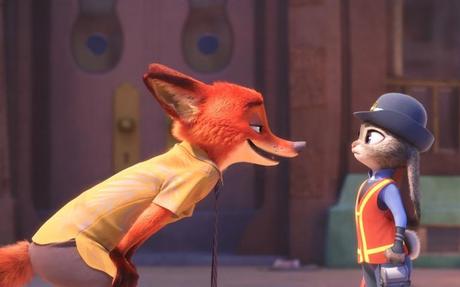
Nick and Judy
However, like so many real life people working jobs which are non-traditional for their gender or race Judy is continually forced to prove herself. The bison police chief (Idris Elba) makes it clear how little he wants her on his police force, and assigns her to meter maid duty. When she challenges herself to excel at the job no one acknowledges her remarkable early accomplishments, and she’s actively mocked by Nick the con man she encounters him on her first day. When she forces her way into working a missing persons case she is only given 48 hours to solve it. If she fails, she has to quit. No one’s going to help her. So she has to partner with a criminal.
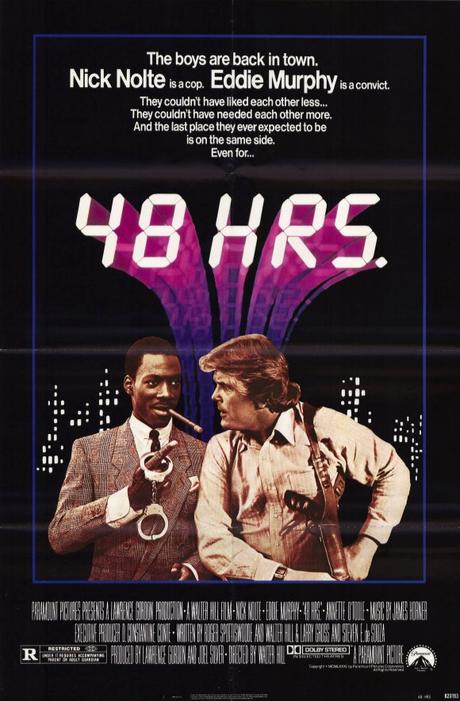
Something about this set-up seems awfully familiar.
This is when Zootopia turns into a buddy cop comedy, with Judy hustling Nick into helping her work the case. Thanks to Jason Bateman’s signature dryly confident line readings, Nick perfectly punctures her optimism, but Judy’s determination eventually wins him over, reminding him of his own abandoned ambitions. There is a hint of prejudice in their early meetings (i.e., he’s a fox, she’s a rabbit, a natural predator/prey relationship), but it becomes mere background noise as they grow closer together.
The case naturally escalates in scale the deeper they go, taking them all across the beautifully animated city, from Tundratown to the Rain Forest District. It’s a suitably twisty plot, with action sequences which never feel superfluous, pop culture references which don’t have to be understood to be enjoyed and a trip to the city’s secret red light district which will be funny for very different reasons to kids and adults.
Then that press conference happens, and all of the laughter goes away for a while. For reasons I won’t further spoil here, the town’s motto of “anyone can be anything” un-officially turns into “anyone of the right kind of species can be anything.” Those prejudices Judy always had against Nick because he’s a fox rapidly drive a wedge between them. The social contract maintaining the peace between predator and prey falls apart. Mothers pull their daughters closer to them when a bigger animal sits next to them on the bus. A pop star voiced by Shakira holds a peace rally, telling a reporter, “This is not the Zootopia I know and love.” She is of course greeted with sign-waving citizens demanding she and her kind “go back where you came from.”
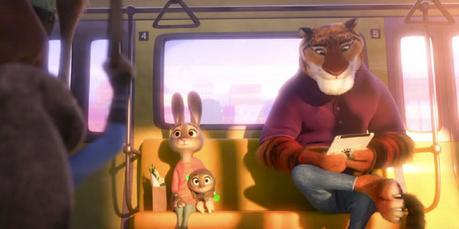 The general analogy being made is obvious. It also causes you to think back to all the ways the movie was building up to this even as it entertained you with its cute creatures and buddy cop plot twits. Nick repeatedly cracks innocent-sounding jokes playing on gender stereotypes since Judy is a woman. Judy has to explain to a genial police clerk (Nate Torrence) that it’s OK for a bunny to call another bunny “cute” but not OK for an outside species to use that word. One big reason Judy landed the missing persons case in the first place is because the missing person in question belonged to an animal grouping which society didn’t care as much about.
The general analogy being made is obvious. It also causes you to think back to all the ways the movie was building up to this even as it entertained you with its cute creatures and buddy cop plot twits. Nick repeatedly cracks innocent-sounding jokes playing on gender stereotypes since Judy is a woman. Judy has to explain to a genial police clerk (Nate Torrence) that it’s OK for a bunny to call another bunny “cute” but not OK for an outside species to use that word. One big reason Judy landed the missing persons case in the first place is because the missing person in question belonged to an animal grouping which society didn’t care as much about.
This starts out as a movie about a bunny overcoming the restrictions of her society to realize her impossible dream, but along the way it turns into a commentary on the prejudices which hold everyone back. Our Leslie Knope-esque bunny cop turns out to be just as fallible as any of us. Instead of being told, “Just believe in yourself. You had it in you this entire time!” to inspire her past the finish line she is forced to look within herself and face her own prejudices. It’s kind of brilliant.
THE BOTTOM LINE
To compare this to another recent Disney product, The Good Dinosaur was a western with dinosaurs, but it ultimately felt scattershot and a product of a troubled production. They didn’t quite the nail the genre they were going for. Zootopia, on the other hand, is a perfectly focused, entirely successful pass at a buddy cop comedy for the majority of its running length, which would already make it a success. Then it goes from 48 Hours to a subversive twist on In the Heat of the Night with astounding precision and power. As such, it’s final act turns into the type of thing which leaves you wanting to simply hug the directors and thank them for making this movie right here and right now at this point in history when the commentary they deliver could not be more topical. That they did it through the mouths of such adorable characters and gorgeous animation makes the medicine go down so much easier.
ROTTENTOMATOES CONSENSUS
99% – “The brilliantly well-rounded Zootopia offers a thoughtful, inclusive message that’s as rich and timely as its sumptuously state-of-the-art animation — all while remaining fast and funny enough to keep younger viewers entertained.”

